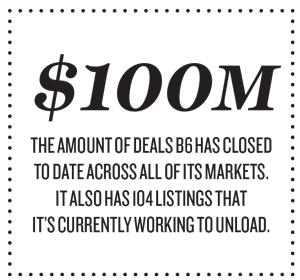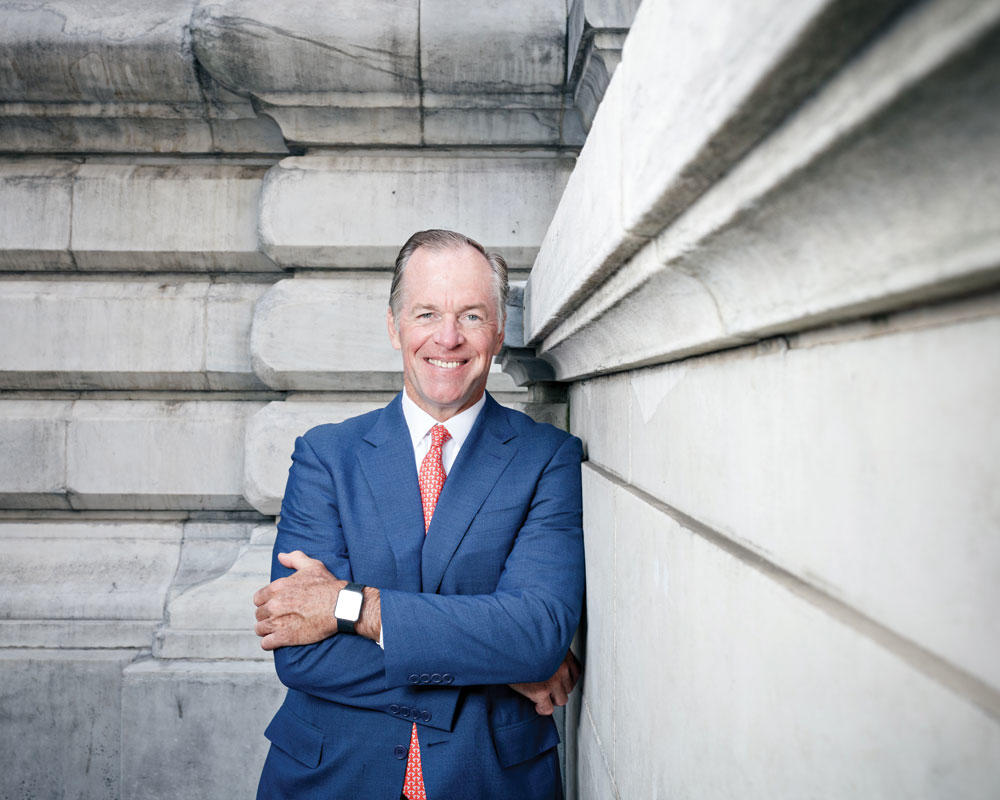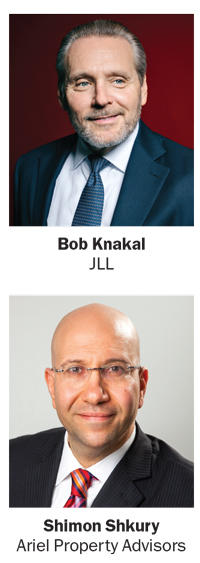“Rain Man” and “Beaches” were playing on the big screen and the Berlin Wall was still standing. The year was 1988 — the same year that Paul Massey and Bob Knakal launched their eponymous New York City investment sales firm.
And now, more than 30 years later, Massey’s career has come full circle.
After the duo famously sold Massey Knakal Realty Services for $100 million to Cushman & Wakefield in 2014, Massey did a stint at the global brokerage and staged a high-profile but long-shot run for mayor in 2017.
When his campaign for the Republican nomination failed to take off and he suddenly dropped out of the race four months before the election, many in the real estate world wondered what the industry veteran would do next.
A year later, in July 2018, he launched B6 Real Estate Advisors.
The firm, which is based out of a 12,000-square-foot office at 1040 Sixth Avenue, kept a low profile at first but recently started a recruiting tear.
Today, it has about 65 employees and plans to grow to 100 before the end of the year.
The firm is “recruiting like crazy,” Massey said, noting that the atmosphere feels similar to the 1988 Massey Knakal launch.
But the company — which is focusing on the lower- and mid-market space, with its sweet spot in the $5 million-to-$20 million range — is ramping up at a tough time for investment sales in the city.
From January through July this year, building sales citywide were about 29 percent lower than they were during the same stretch of 2014, according to data from commercial brokerage Ariel Property Advisors. And the multifamily sector logged its worst first half of the year since 2011, with about $3.4 billion worth of sales across 169 deals citywide.
“The market is clearly slower,” said Shimon Shkury, Ariel’s president. “There’s no question that when the market is slower, the brokerage community in general is a lot less active, which is a challenge.”
Still, to date, B6 has closed about $100 million worth of deals across its markets, and Massey is undeterred.
 While most of Massey’s peers and competitors expressed confidence in his ability to launch another successful company, some said it may be hard to replicate the wild success of Massey Knakal in today’s environment.
While most of Massey’s peers and competitors expressed confidence in his ability to launch another successful company, some said it may be hard to replicate the wild success of Massey Knakal in today’s environment.
One real estate executive, who spoke on the condition of anonymity, said it seemed “a bit odd” for Massey to go back to the stressful world of running a brokerage at this point in his career.
“If this thing fizzles out or he doesn’t get the traction that he sought, that’s the footnote to his career,” the executive said.
“He could have gone out in a blaze of glory with being the guy that sold his company for $100 million and ran for mayor,” he continued. “Now he’s the guy who did that again and couldn’t get something going.”
Bartending for beer
Massey, who is 59 years old, started in real estate after his junior year at Colgate University when he worked at CBRE’s Boston outpost in the data bank — a job he described as less than glamorous.
“I would go out and walk up and down hot buildings in Boston in a suit and figure out where the tenants all were and how much space they had, when their leases were expiring, that kind of thing,” he said.
After graduation, he was gunning for a position of any sort in that same office but was told the Beantown operation was at capacity. CBRE’s New York office, however, was just getting off the ground, and he landed a spot there.
That first CBRE gig, as director of research, paid him only $1,000 a month, so he was also waiting tables and bartending at Hanratty’s, a now-shuttered jazz club on 92nd Street and Second Avenue.
“The $1,000 a month paid my rent,” he said, “and the money I made at the bar bought my beer.”
By his third year at Hanratty’s, bartending was more of a hobby than a necessity.
By then, he was seeing some modest success at CBRE, where he met Knakal in 1983. The two rose to become the top building sales brokers during their final two years at the firm.
Once they launched Massey Knakal, they pioneered their now-famous territory system in which brokers were responsible for small geographic stretches of the city, where they flooded the zone and established relationships with as many building owners as possible.
The company dominated the investment sales market in the outer boroughs with scrappy young brokers who churned out a high volume of deals.
While rumors abound about the role that Massey played at Cushman — one source told The Real Deal in mid-2018 it was a “sin” that the brokerage couldn’t find a place for him — he raved about the global giant.
“[They] treated us like gold,” fully supporting his political aspirations and altering his contract so that he could run for mayor, he said.
But Massey said he ultimately wanted to run his own company rather than climb the corporate ladder, and in April 2018 he left.

And he wasn’t the only one to defect from Cushman, which was in the midst of a massive round of cost-cutting and experiencing its own internal turmoil in the run-up to its IPO. Powerbroker James Nelson decamped to Avison Young; Knakal left for JLL; and a slew of others also jumped ship.
Knakal — who said he and Massey speak frequently and are still close — said he casually entertained joining his old partner at B6 but opted to go to JLL because he prefers closing deals to managing a company.
“Paul always loved running the business, whereas my affinity was always much more for brokering,” he said. “So I’m not surprised at all that I spend the overwhelming majority of my time brokering, and he spends the overwhelming majority of his time growing a business.”
Absorbing another company
Ironically, B6’s top competitors include many of the firms launched by Massey Knakal alumni.
They include Shkury’s Ariel Property, Ofer Cohen’s TerraCRG and Tim King’s CPEX Real Estate.
Knakal said the market would easily absorb a new company.
“There is always room for new players, new brokers, new companies,” Knakal said. “Different aspects of companies and individuals resonate with different people, and it’s not a one-size-fits-all type of industry.”
King agreed, predicting that Massey’s name recognition and connections would help buoy B6.
“He seems to be following many parts of the Massey playbook in terms of the territory and market knowledge,” he said. “That was a winning formula before, and I think that those metrics and that formula can still work.”
B6 has already landed a few big clients, including the College of New Rochelle and Stonehenge NYC CEO Ofer Yardeni.
And it currently has 104 listings on its site as of Aug. 27, in every borough except Staten Island. Just three of them are priced higher than $30 million: one on Kings Highway in Brooklyn for $37 million, another on Jericho Turnpike in Queens for $36 million and a third on Elizabeth Street in Manhattan for $75 million.
B6 has also hired Tom Donovan, DJ Johnston and Neil Heilberg (all Massey Knakal alum) and brought on more junior agents.
“A big thing for me [at Massey Knakal] was managing and mentoring relatively young agents at the time who then turned into very successful big contributors to the real estate business,” Massey said. “I’m really proud of that, and I get that same ability to coach people here.”

Paul Massey (Photo by Axel Dupeux)
More broadly, King said it would likely be harder to build up a new company than to expand an existing one.
“Every potential customer has a pretty broad choice of firms they can choose to work with,” King said. “So Paul and everyone else — myself included — need to be able to show folks what the differentiator is. Why his firm?”
Cohen said TerraCRG would probably compete for some listings with B6, but he said the landscape has shifted since Cushman’s 2014 acquisition.
“In the grand scheme of things, we had one big competitor, which was Massey Knakal Realty,” he said. “They got acquired by Cushman. The team at Cushman split into two: B6 and JLL. So it’s not like there’s more competition. The competition is just a little more bifurcated.”
Shkury said Massey’s years of experience could make B6 even more potent than Massey Knakal was.
“I think he could be very successful doing it all over again,” Shkury said. “I think that in every stage in life, even if it seems like you’re doing the same thing, you’re probably doing it a little differently and maybe a little bit better.”
Strategy session
While Massey — who is married and has three adult children — may have cheerleaders in the industry, he is up against a tough market that recently got much trickier thanks to the sweeping new rent laws that Albany passed this year.
Those laws, which the industry adamantly fought and which Massey also vehemently opposes, dramatically limit landlords’ ability to increase rents and deregulate rent-regulated units.
And many in the industry have blamed those pro-tenant measures for pumping the brakes on activity in New York’s multifamily market.
Massey acknowledged that the multifamily market is largely stalled, but he said it won’t alter B6’s strategy.
 For starters, in addition to the five boroughs, the firm is doing deals in New Jersey and on Long Island. But Massey also said multifamily properties only make up about 20 percent of the firm’s business. And despite doomsday warnings from the industry, he maintained that his brokers are not having much trouble selling properties that are either unregulated or have a small number of rent-stabilized units.
For starters, in addition to the five boroughs, the firm is doing deals in New Jersey and on Long Island. But Massey also said multifamily properties only make up about 20 percent of the firm’s business. And despite doomsday warnings from the industry, he maintained that his brokers are not having much trouble selling properties that are either unregulated or have a small number of rent-stabilized units.
In addition, B6 will be going after debt deals. Massey noted that the average landlord in New York sells a property once every 39 years but refinances every four or five years. He said he’s planning to form at least 20 debt teams, which he’ll partner with sales brokers more often.
“We think that’s the way forward,” he said, “and we think that’s going to be a powerful combination where we’re helping the clients more strategically than we ever had with sale options but also other options for capital.”
The city, he predicted, would undoubtedly feel the negative effects of the state’s rent reform laws once it sees property assessments and, in turn, property tax revenue fall.
“When the city realizes it’s killing the golden goose, which is the real estate industry, it will hopefully wake up and do something about it,” he said. “Common sense has to prevail at some point.”
And although the brokerage business has recently been hit with a wave of major mergers, including JLL’s roughly $2 billion purchase of HFF and Newmark’s purchase of RKF, Massey said he’s not looking to sell this time around.
“This is not ‘build a company up and sell it’ again,” he said. “We’ve done that already.”
Instead, he eventually wants to establish a presence in other cities like Chicago and Boston and create a succession plan to make sure someone can continue running the firm when he steps down. But, he said, he has no intention of doing that anytime soon.
“I’m committed long-term to this,” he said. “I’m having a lot of fun, and we have big aspirations for this business. I want to realize them.”
